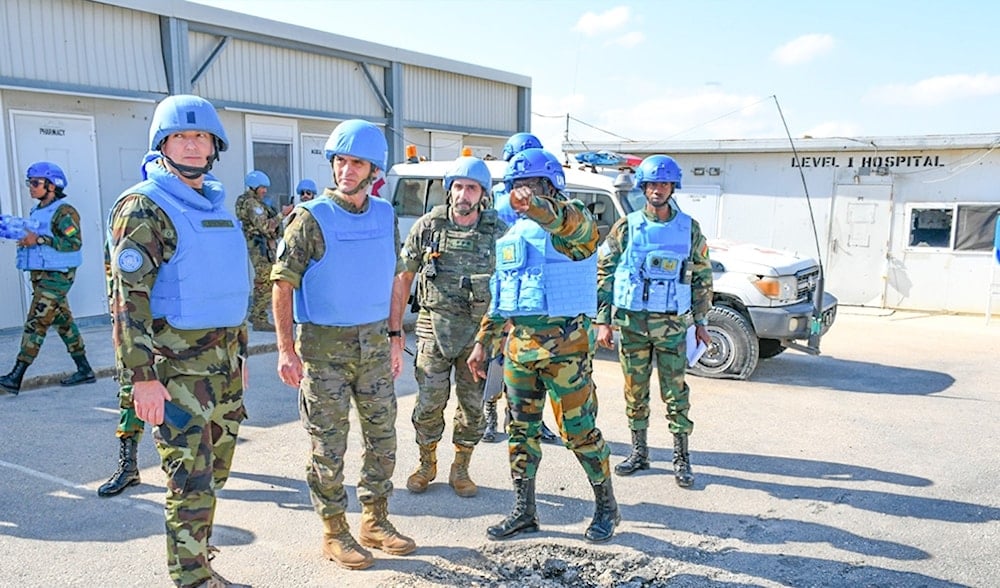Implementing Resolution 1701 hinges on sovereignty, UNIFIL warns
UNIFIL stresses that full respect for Lebanon’s sovereignty and territorial integrity is essential to advancing Resolution 1701 and achieving lasting stability.
-

The Force Commander (FC) of the United Nations Interim Force in Lebanon (UNIFIL), Lieutenant General (Lt Gen) Aroldo Lázaro Sáenz, pays a working visit to the Headquarters of Ghana Battalion (GHANBATT) at UNP 5-66 on Wednesday, 30 October 2024. (@GhArmedForces / X)
The head of the UN peacekeeping mission in Lebanon (UNIFIL) and its Force Commander, Major General Aroldo Lazaro Saenz, reaffirmed UNIFIL’s ongoing commitment to supporting the Lebanese Army, which he described as “our partner in promoting stability in the south.”
In a statement issued on the occasion of the 82nd anniversary of Lebanon’s Independence, Lazaro emphasized that the full redeployment of the Lebanese Army throughout the southern regions represents "a critical milestone in reinforcing the authority of the state and extending its sovereignty to all its territories".
He further stressed that unwavering respect for Lebanon’s sovereignty and territorial integrity remains “central to advancing the implementation of Resolution 1701 and creating the conditions for lasting stability,” noting that the resolution continues to be the cornerstone of the security framework in southern Lebanon.
Resolution 1701 was reached in the wake of the 2006 Israeli war on Lebanon. It calls for the full cessation of hostilities and the deployment of the Lebanese Army to Southern Lebanon, as well as the establishment of a demilitarized zone between the Blue Line and the Litani River. "Israel" has violated the Resolution since it was enacted in 2006, and continues to do so to this day.
Lazaro added that UNIFIL personnel gathered at the mission’s headquarters last week to mark Lebanon’s Independence Day, “renewing their support for Lebanon, its stability, and its sovereignty,” in a gesture reflecting the mission’s enduring partnership with the Lebanese people and institutions.
Sovereignty can't be partial, Lebanese land will be liberated: Aoun
Lebanese President Joseph Aoun marked the same occasion with a national address from South Lebanon, calling for a renewed commitment to state sovereignty and unity amid escalating regional tensions.
Speaking on Friday from a region he described as the "frontline of Lebanon’s struggle for independence," Aoun said, “Independence starts from the moment we face the truth. That is why I came to South Lebanon, a land that reflects Lebanon’s enduring history of resilience.” He emphasized that sovereignty cannot be partial and must include the liberation of “every inch of Lebanese territory.”
The president highlighted Lebanon’s long battle to secure its freedom, from the sacrifices of the country’s independence martyrs to the wars and political turmoil that followed. While honoring those who gave their lives for the nation, he warned that Lebanon is once again facing a decisive moment that could either strengthen or undermine its independence.
He also reflected on the decades of turmoil that followed Lebanon’s original independence, recalling how regional pressures and internal weakness led the country into “a succession of complex wars,” arguing that the post-war Taif Accords failed to restore full sovereignty, instead placing Lebanon under renewed foreign influence.
Although the end of the occupation provided another chance to rebuild its independence, he said Lebanon once again became a battleground for competing regional powers seeking to shape its political direction.
Read more: UNIFIL: 'Israel' violated Lebanon’s airspace 7,300 times since deal

 3 Min Read
3 Min Read










